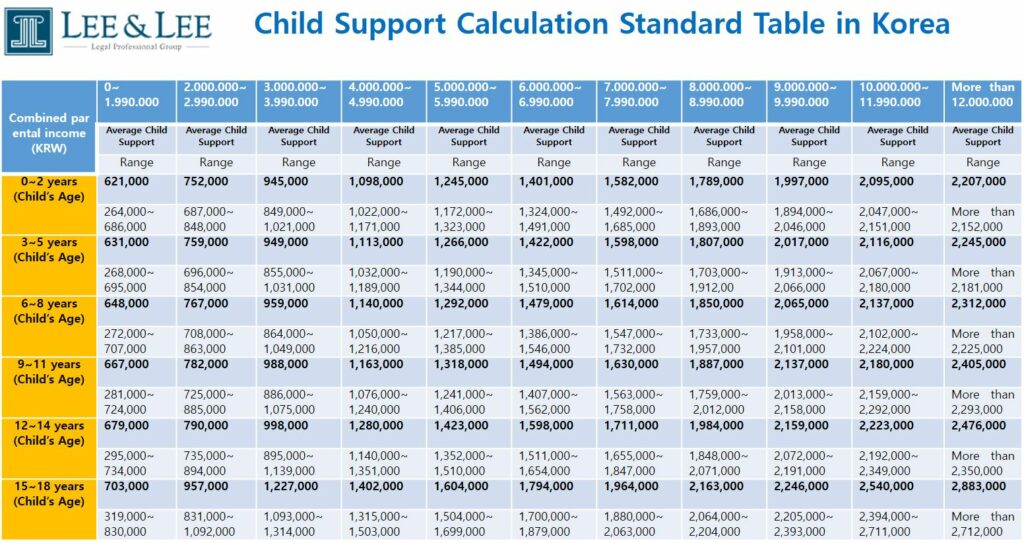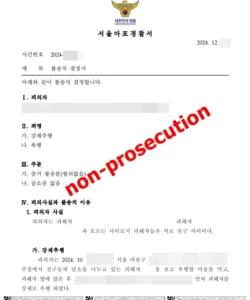This article is designed to offer a comprehensive understanding of the rights and obligations in regard to child custody, child support, and parental authority when getting a divorce in Korea as a foreigner.
In Korea, parental authority refers to all of the rights granted to parents over their minor children, primarily concerning their protection and upbringing. This authority includes the right to care for and protect the child, as well as manage their property, with the primary objective of parental authority being the child’s welfare. Parental authority also encompasses various responsibilities, including being responsible for the child’s protection, education, and discipline, but it also includes the right to determine the child’s residence and the right to express authority by making decisions and giving/revoking consent.
Among these, however, child custody is the most significant. While child custody specifically refers to the right to nurture and educate the minor under the protection of the parents, parental authority grants broader rights to make decisions regarding the child’s status and property.
Additionally, parents who do not have physical custody still retain the right to mutual visitation with their children (as per Civil Act Article 837-2), which is also considered an essential component of parental authority necessary for the child’s positive growth and development.
1. Divorce and Child Custody in Korea
Table of Contents
1) Parental Rights
(1) Exercising Parental Authority
Parental authority refers to the rights and duties that parents have over their minor children in terms of status and property. Parents assume parental authority over their minor children, and in the case of adopted children, the adoptive parents assume these rights (Civil Act Article 909-1).
During marriage, parental authority is jointly exercised by both parents. In the event of a divorce, the custodian must be designated (Civil Act Article 909-2 to 909-5).
(2) Rights and Duties of the Custodian
The custodian, whether it is the father or mother, becomes the legal representative of their minor child (Civil Act Article 911), with the following primary rights and duties:
1. The right and obligation to protect and educate the child (Civil Act Article 913).
2. The right to determine the child’s residence (Civil Act Article 914).
3. The right to manage the child’s individually acquired properties (Civil Act Article 916).
4. The right to act on behalf of the child in juristic acts concerning their property (Civil Act Article 920).
2) Designation of the Custodian
(1) In Consensual Divorce Cases
In the case of a consensual divorce, the parents must agree on who will be the custodian. If they cannot reach an agreement, or if no agreement is made, the Family Court will appoint the custodian at its discretion or upon the request of one of the parties.
Even after a custodian was appointed, the Family Court may, if deemed necessary for the welfare of a child and upon request of a relative of the child within the fourth degree of relationship, appoint the other party as the custodian.
| Civil Act, Article 909 (Custodian) | |
| (1) | Parents shall have the parental authority of their minor child. In cases of an adopted child, the adoptive parents shall have the parental authority. <Amended by Act No. 7427, Mar. 31, 2005> |
| (2) |
The parental authority shall be jointly exercised by both parents during their marriage. If the parents fail to reach an agreement, the Family Court shall determine it upon the request of the parties. |
| (3) |
When one parent is unable to exercise the parental authority, the other shall exercise it. |
| (4) |
If a child born out of wedlock is legally recognized and his parents are to be divorced, the custodian shall be determined by an agreement between the parents, and, if such agreement cannot or would not be made, the Family Court shall designate the custodian upon the request of the parties or ex officio: Provided, That if the agreement between the parents harms children’s welfare, the Family Court shall order to correct it or ex officio decide the custodian. |
| (5) |
In cases of the annulment of marriage, judicial divorce, or action demanding affiliation, the Family Court shall ex officio determine the custodian. <Amended by Act No. 7427, Mar. 31, 2005> |
| (6) | The Family Court may, if deemed necessary for the welfare of a child, alter the person of the parental authority to the other party upon request of a relative of the child within the fourth degree of relationship. |
(2) In Judicial Divorce Cases
In the case of a judicial divorce, the Family Court designates the custodian.
And again, even after a custodian was appointed, the Family Court may, if deemed necessary for the welfare of a child and upon request of a relative of the child within the fourth degree of relationship, appoint the other party as the custodian.
3) Custody Rights
(1) Exercising Custody Rights
Custody typically refers to having the minor child under one’s care and providing education and nurturing, while custody rights refer to the parent’s rights to make decisions necessary for the upbringing of the child. During marriage, both parents jointly exercise custody rights, but in case of a divorce, a custodian needs to be designated.
Parental authority encompasses the rights to make decisions about the child’s status and property, whereas custody specifically refers to the right to nurture and educate the minor under the protection of the parents. Parental authority is thus a broader concept compared to that of custody rights.
In the case of a divorce, either one or both parents can be designated as the parental authority and the holder of custody rights, and these roles can be separately specified. If designated separately, the scope of parental authority applies, with the exclusion of the aspects covered under custody.
(2) Distinction Between Custody and Parental Authority
Parental authority encompasses the rights to make decisions about the child’s status and property, whereas custody specifically refers to the right to nurture and educate the minor under the protection of the parents. Parental authority is thus a broader concept compared to that of custody rights.
In the case of a divorce, either one or both parents can be designated as the parental authority and the holder of custody rights, and these roles can be separately specified. If designated separately, the scope of parental authority applies, with the exclusion of the aspects covered under custody.
4) Designation of the Custodial Parent
(1) Decision on Custody Matters
In the case of a divorce, the couple must agree on custody-related matters, including the decision of who will be the parent assuming custody rights. If they fail to reach an agreement, the Family Court decides on these matters either autonomously or based on a party’s request. The court will decide on:
1. Who will be assigned custody of the child
2. The responsibility to provide child support
3. The exercise of visitation rights and the methods thereof.
(2) Modification of Custody Matters
Even after custody arrangements are decided, if a change is deemed necessary for the child’s welfare, the Family Court can modify these arrangements based on requests from either parent, the child, or a prosecutor.
5) Status of Non-Custodial Parents
Divorce does not alter the fundamental rights and duties between parents and children. The blood relationship (Civil Act Article 768) to the child, consent rights over their minor child’s marriage (Civil Act Article 808-1), the obligation to provide support (Civil Act Article 974-1), and inheritance rights (Civil Act Article 1000-1) remain intact.
2. Changes to the Designation of Parental or Custody Rights
1) Requesting Changes
Even if it was designated at the time of divorce which parent should hold parental or custody rights, the decision can be changed afterwards, if deemed necessary for the child’s welfare. The custodian with parental rights can be changed through an application to the Family Court, while changes in the custody arrangement can be made by agreement between the parties after the divorce. If no agreement is reached, the Family Court can be petitioned to order a change.
2) Eligibility to Request Changes
Changes concerning custody can be requested by the father, mother, child, or prosecutor, and the Family Court can also make changes on its own initiative. Changes to the person with parental rights can be requested by relatives within the fourth degree of kinship to the child.
3) Criteria for a Change
The Family Court considers the child’s age, the parents’ financial situation, and other relevant circumstances when deciding whether to enact a change in regard to the person with parental or with custody rights (Supreme Court Decision on July 10, 1998, Case No. 98Su1718). Especially if the child is already over 13 years old, the Family Court must consider the child’s opinion, unless it is determined that it is not possible to do so, or that doing so would harm the child’s welfare.
4) Notification of Custodian Change
If a decision to change the custodian is finalized, the person who petitioned for the change, or the newly appointed custodian, has to file a notification of change at the municipal office that has jurisdiction over the area where the child resides. This must be done within one month from the date of the final decision, and the application must include a copy of the court decision and a certificate of finalization.
3. Parent’s Request for Child Recovery
1) Filing a Child Recovery Petition with the Family Court
The custodial parent needs to have the child under his or her care for the child’s upbringing. However, it is not advisable to just take the child arbitrarily if the ex-wife or ex-husband, who has not been given custody, refuses to let the child go. This is because such an act of self-enforcement is in principle prohibited. In order to get your child back, you need to file a recovery order with the Family Court.
2) Preliminary Child Recovery Order
It can take some time for a child recovery order to be finalized. If you can provide grounds as to why you need to get your child back quickly, you can apply to the court handling the case for a preliminary disposition of the case so that you can get your child back before the judgment is finalized.
3) Measures and Enforcement regarding Non-fulfillment of Child Return Obligations
If the other party does not return the child even after receiving the child return order, you can apply to the family court for an enforcement order to urge the other party to fulfill the obligation to return the child
If the other party fails to comply with this order, you can apply to the family court again to impose a fine of not more than 10 million won on the other party, and if the other party fails to return the child within 30 days, you can further enforce compliance by detaining (holding) the other party in a detention facility such as in police detention, a detention center, or prison.
In addition to the order, you can also authorize an enforcement officer to retrieve your child.
4. Visitation Rights for Non-Custodial Parents
1) What are Visitation Rights?
After a divorce, the non-custodial parent and the child have the right to maintain contact through visitation. This can extend to various methods of contact, such as meeting in person, exchanging letters, phone calls, gift exchanges, or even temporary stays, such as over weekends. After a divorce, the immediate family members of the non-custodial parent may also petition the family court to be granted visitation with the child, if that parent is deceased or unable to see the child due to illness, living abroad, or other unavoidable circumstances. In this case, the Family Court will consider the child’s wishes, the relationship of the person requesting the visitation with the child, the motivation for their request, and other circumstances when making a decision.
2) Restrictions and Exclusions of Visitation Rights
The exercise of visitation rights must always consider the child’s welfare (Civil Act Article 912) a priority. Therefore, visitation may be restricted, excluded, or modified at the request of a party or by the Family Court at its own discretion, if deemed necessary for the child’s welfare, such as if the child is unwilling to see the parent or if there were grounds for the termination of parental rights.
3) Petitions for Visitation
The method and scope of visitation can be decided by agreement between the parents. If they fail to reach an agreement, the Family Court can be petitioned to determine the arrangements.
4) Visitation Rights After Remarriage and Adoption
When a divorced parent remarries and adopts a child with their new spouse, the visitation rights of the biological parents no longer apply. The adoptee is regarded as a child born within the new marriage, and previous familial ties are considered legally terminated.
5) Enforcement of Visitation Obligations
(1) Application for Enforcement Order
If the other party fails or refuses to comply with the visitation obligations without a valid reason, the aggrieved party can apply to the Family Court for an enforcement order.
(2) Penalties for Non-Compliance
If the party fails to comply with the enforcement order, the Family Court can impose a fine of up to 10 million KRW. However, unlike cases such as alimony and child custody petitions, you cannot apply to enforce compliance in regard to visitation through a family court order by incarcerating (holding) the other party, because doing so would create a parenting vacuum that could harm the child’s welfare.
5. Child Support in Korea
1) Obligation to pay Child Support
(1) Principle of Shared Responsibility
The costs associated with raising a child are to be shared by both parents, even after a divorce. If one parent has custody, they can claim child support from the non-custodial parent (Supreme Court Decision 1992. 1. 21., Case No. 91Mu689). If a third party is the custodial parent, child support can be demanded from both parents.
Typically, the obligation to pay child support continues until the child reaches adulthood (age 19), and the child support amount calculations are made under consideration of the parent’s financial situation as well as other relevant circumstances.
(2) Claiming Child Support
The amount of child support can be agreed upon at the time of divorce. If no agreement is reached, it can also be determined by court order. If it is necessary to secure future child support payments in advance, a lawsuit for the designation of the custodial parent can be combined with a claim for future enforcement and filed concurrently with the claim for child support.
Furthermore, if only one parent has been providing care for the child due to specific circumstances, that parent may also claim past unpaid child support. When deemed particularly necessary for a child support claim case, the Family Court may also order the parties to submit a list of assets detailing a breakdown of their property, either at the discretion of the court or at the request of the parties. If a person who receives an order to submit a list of assets refuses to submit without a justifiable reason or submits false statements, a fine of not more than 10 million won will be imposed.
(3) Standards for Determining Child Support:*
The standards for child support in Korea for the year 2025 are as follows:
| 2025 Child Support Calculation Standard Table |

2) Methods of Paying Child Support
In Korea, there are no restrictions on the methods and forms of child support payments. Payments can be made in a lump sum or in installments. Additionally, payments can be made in cash or provided in other forms, such as real estate.
3) Changes in Child Support
After child support arrangements have been set, the parties can agree to modify the amount of child support if there is a change of circumstances. If an agreement cannot be reached, the court can be petitioned to decide on the details of the alteration. Changes in personal economic circumstances or general inflation of prices are examples of special circumstances that might warrant an adjustment of the child support amounts.
4) Enforcement Methods and Penalties for Non-Payment of Child Support
If a former spouse fails to pay child support, various enforcement measures can be taken, including direct payment orders, collateral orders, and lump-sum payment orders, along with enforcement orders and compulsory execution.
The Korean Family Court can order that regular child support payments be deducted directly from the party(the “child support debtor”)’s salary by their employer if the party fails to make child support payments twice or more without a valid reason. This can be arranged at the request of the party who holds the right for regular child support payments (“child support creditor”).
Additionally, the Family Court can order the child support debtor to provide adequate collateral to ensure payment or, in cases where the debtor fails to comply without a valid reason, can even order incarceration of the debtor for up to 30 days if the payment is not made within this period, and upon the creditor’s request.
6. Q&A (Child Custody and Support in Korea)
Q1. Do the same child custody laws apply to foreigners living in Korea?
A1. Yes. The Korean Family Court does not make unfavorable decisions regarding child custody and parental rights based on a spouse being a foreigner. There are precedents in Korean courts that ensure parental and custody rights are protected for foreigners just as they are for locals.
Q2. How is child support calculated in Korea?
A2. In principle, child support in Korea is calculated based on the non-custodial parent’s income, the child’s specific needs, and other relevant factors. The Korean Family Court also provides a standard chart for child support, that outlines the appropriate amounts based on the child/ren’s age as well as the parents’ incomes. Ultimately, the court aims to ensure that the child’s living standards align with the economic situations of both parents.
Q3. Can a parent living abroad take their child out of Korea during or after a custody dispute?
A3. Legal permission is required to take a child out of Korea during or after a custody dispute, especially if it contradicts the custody agreement. Violating the terms of a custody agreement can have serious legal consequences.
Q4. How long are custody trials in Korea?
A4. If the parties can reach an amicable agreement on property division and custody, the lawsuit can be concluded within 6 months. However, if the other party is uncooperative or refuses to reach an agreement, it can take up to 12 months. If an appeal is filed against the trial outcome, the proceedings may take even longer.
Q5. How is child custody determined in Korea and is joint custody commonly granted?
A5. Joint custody is very rarely granted in Korea; typically, custody is awarded to one parent. Child custody decisions in Korea depend on various factors such as the child’s age, the financial situation of the parents, and who is the primary caregiver.
Joint Custody in Korea: Attorney Kristen Lee Leads Landmark Court Ruling



